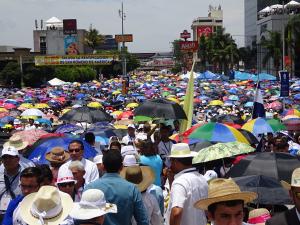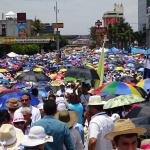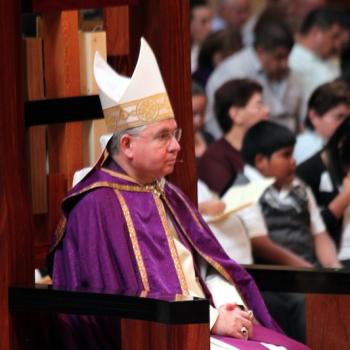When I was ordained a priest I never imagined that I would become so immersed into the issue of immigration. I knew that as an immigrant I would serve fellow immigrants, and I anticipated working with Spanish-speaking Catholics since I spoke Spanish. I could not imagine however that I would be bailing parishioners out of jail, serving as mediator between the police department and my parishioners, helping parishioners go to marches in Atlanta and Washington, that I would be misquoted and attacked online and in the local newspaper, and I would get into debates with some pretty angry people.
Many ask why the Catholic Church speaks on the issue of immigration, and some cast stones at faithful Catholics wrongly accusing them of mixing faith and politics. The Church speaks on immigration issues because as Christians we recognize the dignity of every human person. We believe that this dignity is given by God, and not by any government. It is a dignity that is never stripped away regardless of choices made in life. The contemporary atheist German philosopher Jürgen Habermas encourages the Church to speak up in the public forum in a language those outside the Church can understand because he is convinced the Church has much to offer in the refining of morality in the secular world. After advocating for the privatization of religion for many years, Habermas realized the indispensable role of the Church in the formation and continuation of culture, so he changed his philosophy. The Church’s rich tradition and centuries of contemplation have much to contribute in the public debate of many topics, not just immigration, but also healthcare, abortion, gun control, etc.
Many years ago, a parishioner approached me after having attended a talk on immigration at the parish given by a lawyer who represents Catholic interests at the State Capitol in Atlanta. The parishioner said to me respectfully, “Father, I still think that when you help these people, you are condoning what they have done. The church should not help them.” I responded gently, “twice a month I go down to the state prison. I hear confessions, celebrate Mass and spend time with the men. Most of them are serving life sentences without the possibility for parole. I go there because there is a need and because I recognize their unstained dignity before God.”
The preaching of the Gospel has concrete consequences and it may lead us to a place where we are made uncomfortable and challenged. To believe that every human person is created in the image and likeness of God regardless of skin color, gender, skill, immigration status, etc., has consequences.
Immigration has been on the forefront lately, but despite the various recent events, we must not forget the fundamental issue that gives rise to our national immigration dilemma. For years the United States Catholic Bishops have called on Congress to pass comprehensive immigration reform that recognizes the nation’s demand for labor. This is the reason why there are so many undocumented immigrants in the United States – because the legal ways to enter are extremely limited. There is no ‘back of the line’ for today’s immigrants.
Generally, one can enter the United States legally under one of three conditions: 1) An immediate family member who is a citizen or resident petitions you, 2) You are fleeing political persecution in your home country and there is fear you may be killed, 3) You possess a particular highly developed skill not found in the US and a company sponsors you.
Most unauthorized immigrants in the United States are not high-skilled workers (engineers, lawyers, CEOs), and there is a need for them. Most work in agriculture, meatpacking, landscaping and construction industries which do not qualify as high-skilled work. The US government officially makes available around 200,000 agricultural and non-agricultural temporary visas each year, but companies shy away from these because the red tape is tremendous and the expenses are high. Offering a higher number of temporary visas in an efficient manner would significantly decrease unauthorized crossings of the border, and the over staying of visas by foreigners.
The United States Bishops firmly believe that immigrants should come into the United States lawfully, but they point out that the current immigration system does not recognize the country’s need for labor. The demand far exceeds the supply. The Church calls for a reform that increases the number of visas available for low-skilled workers which will in turn decrease the number of unauthorized entries into the country. Effectively what we have today is an indispensable subcategory of workers who have no possibility of regularizing their legal status or even petitioning it, and they continue to work because they are needed.
The Church will continue to speak on immigration as she speaks on other social issues because the Church has wisdom and insight to contribute. The Church does not expect that governments will do her bidding, but she speaks so that individual hearts may be transformed. The Church will continue to challenge society to recognize the dignity of every human person and to embrace the consequences that follow from it. Immigration policy must respect the dignity of each person, and fix the disparity between supply and demand of visas for workers that are needed.
Picture is mine, all rights reserved.













